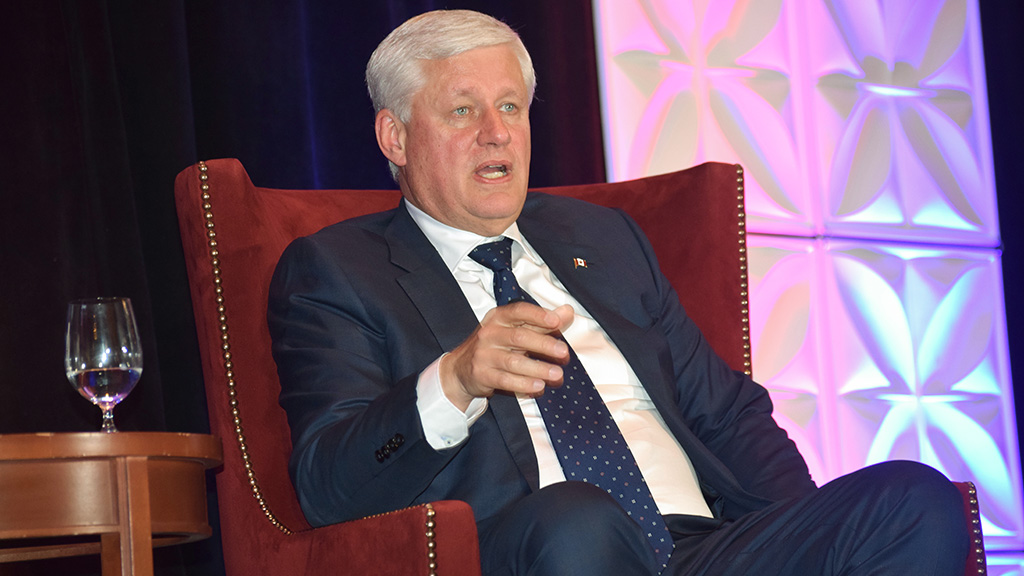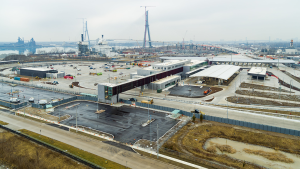Former Canadian prime minister Stephen Harper told delegates attending the recent Ontario Road Builders’ Association (ORBA) convention in Toronto his government proved less bureaucracy is better when it comes to getting important infrastructure built.
During a wide-ranging, hour-long fireside chat held Feb. 6 and hosted by Catherine Clark, the daughter of an ex-prime minister, Harper touched on the current political climate in Canada as well as the upcoming U.S. election.
Harper, 64, was prime minister from 2006 to 2015, winning three elections. At the ORBA convention he refrained from extensive attacks on Prime Minister Justin Trudeau and his government, referring a few times to the Liberals’ tendency to place barriers in front of private enterprise.
“What you do is really critical to not just the future of the economy of this province, but frankly to the convenience of life and operations for everybody’s household and for all the other industries that you serve,” said Harper.
Two infrastructure projects in the roadbuilding sector that he is proudest of, Harper said, are the extension of the Dempster highway from Inuvik to Tuktoyaktuk and negotiations to start construction of the Gordie Howe International Bridge between Detroit and Windsor, Ont., currently underway.
“By the way, I have to tell you, I am proud I actually took that name and ran it by the governor of Michigan,” said the long-time hockey fan.
When the financial crisis of 2008 hit followed by deep recession, Harper recounted, U.S. President George W. Bush assembled leaders of the major economies and international financial institutions to come up with a plan.
Stimulus spending was their answer, with a lot to be spent on infrastructure.
“We concluded that if an infrastructure program was going to be of any value, we had to roll the money out the door and get the projects underway quickly,” said Harper, who is now a consultant and runs a hedge fund.
Federal cabinet ministers John Flaherty and John Baird had responsibility for rolling out the plan. They worked with provincial and municipal governments to identify projects that could move forward quickly.
“Our role was to clean away as much approval process as possible to get this stuff going,” Harper said.
“Minister Baird just literally had 90 per cent of the normal evaluation, assessment, approval process eliminated, just totally eliminated, and just said, ‘We’re going to take a risk and…fast track just using a very small number of rules.’”
Generally, Harper said, the gamble paid off with projects overseen and executed smoothly.
Once the Harper government won a majority in the subsequent election, they made the changes permanent through the 2012 Canadian Environmental Assessment Act — “which this government came in and completely reversed,” Harper said.
During that same era, the federal government was discussing labour market agreements with the provinces and the issue of skilled trades came up.
His government, he said, had grave concerns about educational and training systems producing the workers Canada would need in the future. But the provinces didn’t see it as a problem.
“With the exception of a few great technical schools, educational institutions don’t care about labour markets,” Harper said. “That’s not how they judge whether the programs are working, they just care about whether their enrolments are.
“So the fact that we’re graduating every year now tens of thousands of really, on paper, highly educated but unemployable university graduates and a dearth, an absolute dearth, of skilled trades people is of no concern to them.
“It’s going to take years, having missed the window…to fix it.”
Follow the author on Twitter @DonWall_DCN.






Recent Comments
comments for this post are closed